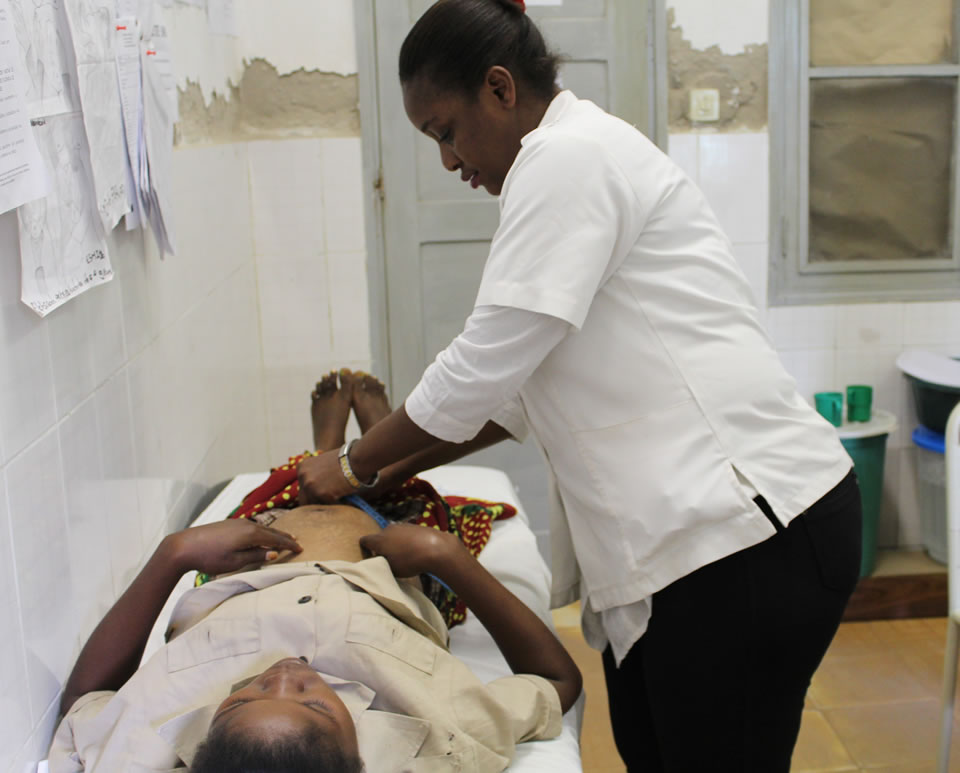Laying on the wooden bench in the waiting room, a young woman, Mariamo Lúcio, wears a blanket. Although it is a hot day, she feels cold while she awaits antenatal care at Chabeco Health Facilityin Quelimane, Zambézia. She has a high fever, headaches and muscle pain, vertigo and vomiting.
“I started moaning in the afternoon until night. My grandmother covered me with three sheets and a blanket, but I still felt very cold and then very hot,” remembers Lúcio.
At the health facility, the maternal and child health nurse, Josefina, who was trained by the PMI-supported Maternal and Child Survival Program (MCSP), tested Lúcio with a rapid diagnostic test for malaria. The result was positive. Because Lúcio was HIV-positive and on an antiretroviral treatment with prophylactic Cotrimoxazole, she did not receive intermittent preventive treatment of malaria in pregnancy with sulfadoxine-pyrimethamine (SP); the two drugs are incompatible and could cause serious side effects. As such, she had a higher risk of contracting malaria.
Josefina immediately gave artemether-lumefantrine, the first-line treatment for uncomplicated malaria, to Lúcio to take over the course of three days. She also recommended that Lúcio sleep under a mosquito net every night. Lúcio successfully completed the treatment as the nurse recommended, and two days later improved.
Although Mozambique has made significant progress in malaria control in recent years, the disease is still the major cause of morbidity and mortality in the country, accounting for 23 percent of deaths in pregnant women. Zambézia province has one of the highest malaria prevalence in the country, but the current rates of intermittent preventive treatment of malaria in pregnancy in the country are low. According to the 2015 combined Immunization, Malaria, and HIV/AIDS Indicator Survey, less than 25 percent of women received three or more doses of intermittent preventive treatment of malaria in pregnancy during their last pregnancy; however, WHO guidelines on intermittent preventive treatment of malaria in pregnancy being implemented in Mozambique recommend monthly doses of SP at the beginning of the second trimester.
MCSP promotes prevention of malaria in pregnant women through support of intermittent preventive treatment of malaria in pregnancy and long-lasting insecticide-treated net use. This malaria prevention is vital to avoiding complications such as miscarriage, stillbirth, premature birth, intrauterine growth delay, low birth weight, maternal and neonatal anemia and maternal and neonatal mortality.
As demonstrated through Lúcio’s case, MCSP also works together with the Ministry of Health to ensure proper malaria diagnosis and treatment, making sure that rapid diagnostic tests are readily available at health facilities and staff are trained in their use. MCSP provides trainings, supervision, and mentorship for health providers on malaria case management, especially during pregnancy.
“If she hadn’t come to the facility for medical care, she might not be with us today.”
-Telma Saize, Nurse
Nurse Telma Saize from the Chabeco health facility, who cared for Lúcio during a follow-up visit, was also trained by MCSP. She feels more confident and ready to manage malaria in pregnancy correctly, including in difficult situations similar to Lúcio’s where intermittent preventive treatment of malaria in pregnancy is not an option. She also knows that she needs to take the time to explain Lúcio’s pregnancy, HIV status, why she couldn’t receive intermittent preventive treatment of malaria in pregnancy, and how that led to malaria.
“I feel much better now. I know how to prevent malaria and I will always sleep under a mosquito net at night because I want to see my baby born healthy,” said Lúcio.

